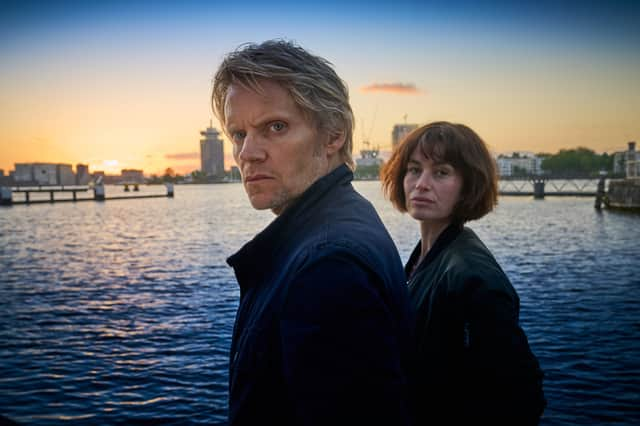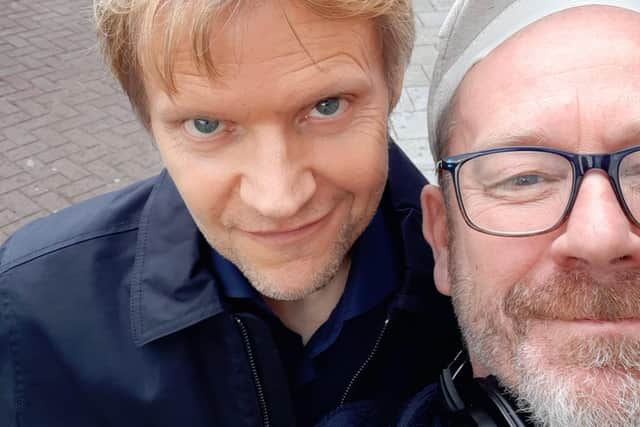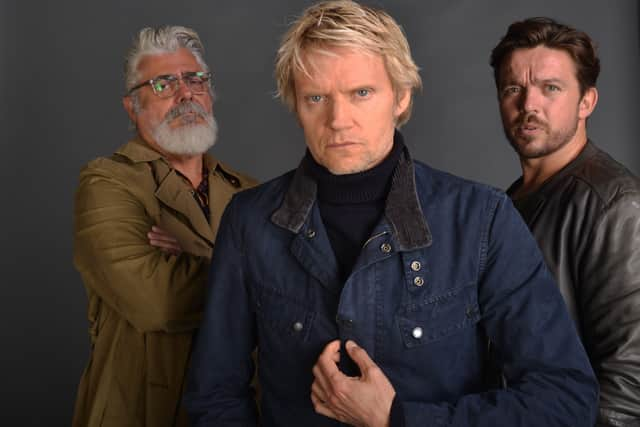Van der Valk writer Chris Murray on Series 2 of the ITV drama: ‘There is always an appetite for crime shows’


Chris Murray is the writer, producer, and showrunner of the ITV crime drama Van der Valk. Set to return this weekend, Van der Valk follows Dutch detective Piet van der Valk as he solves crimes in and around Amsterdam.
Murray recently joined Alex Moreland to talk about the new series of Van der Valk, discussing how the new series compares to both its 2019 predecessor and the 1970s iteration of Van der Valk. He also explained how valuable it is to write from Amsterdam when approaching each episode, as well emphasising the important of balancing the overarching crime plot with moments of character drama.
Advertisement
Hide AdAdvertisement
Hide AdSo, just to get things started – can you set the scene for us a little bit and tell us how you started work on series 2?
We knew what we wanted to achieve in series one, in terms of the set up: a little bit of a backstory with Van der Valk, [establishing] that he was carrying a burden, the weight of the world on his shoulders. By the end of Series 1, we revealed that he lost the love of his life previously – in Series 2, we wanted to pick up from that, we wanted to learn from that.
We talked to Marc [Warren, who plays Van der Valk] about having a sense that he’s open and looking to the horizon. We don’t do a lot of serial stuff, but in Series 1 he was closed off because of his past tragedy, and in Series 2 he’s open to the possibility of love. That’s where we wanted to pick up with him with the rest of the team.
What also went down quite well with Series 1 – it seems an awful long time ago now – but the ensemble landed. We will claim credit – as if we knew what we were doing! – but we didn’t really know. The ensemble landed really well, we got the casting right. We tried to build on that. Even though the show has those murders and there’s crime, we like the idea that [it’s set in] a benign universe. That’s reflected in our team – we want an audience to want to spend time with the team, which is what you want on any show, really.
Advertisement
Hide AdAdvertisement
Hide AdDo you spend much time in Amsterdam, during the production of the show?
Not the whole time, I come and go. And obviously, during COVID, we were quite sparing in visits to set. But yeah, usually I’m there – I’m going out the week after next for some post-production stuff. I kind of yo-yo, but I do like being there.
All the worlds of the episodes grow out of Amsterdam: that first episode grew out of [our] brilliant art department and locations team, part of whose job is just to take me and Maria [Ward, a frequent co-writer] around places and show us bits of Amsterdam as inspiration. They took us to a few alternative communities, where people were either squatting or living an alternative lifestyle. Amsterdam has a rich tradition of that, which we didn’t know, but then you learn about that and a story bubbles up from it.
Episode 2 is set in the world of the diamond industry, which grew out of out of becoming familiar with diamonds in Amsterdam. Episode 3 is set in a world of classical music, which, again, there’s a vibrant classical music scene in Amsterdam. There’s good reason for spending time in Amsterdam: stories grow out of that, and it feels a bit more organic than sitting in England and thinking.
Advertisement
Hide AdAdvertisement
Hide Ad

When you’re writing these murder mysteries, how do you approach the structure of them? Twists and turns, building in clues to the suspects – how do you keep that straight in your head as you’re writing the script?
I didn’t! No, I don’t know. I mean, I co-wrote [one episode] with Maria Ward, and so there’s a back and forth, which helps. Deadlines help! But I think I’ve done a lot of two-hour structure, the ITV template [scripts], so I guess you have – whether you’re aware of it or not – a sort of inbuilt structure. You know you need a strong midpoint, you know where the breaks going to be. All that helps, even if they’re just tent pegs.
One is aware that, you know, you tend to do the same thing over and over to a degree. We were conscious of that [with the] first episode, for example, partly because of being off air for a couple of years. We wanted it to have a bigger sense of scale: we did a bit of a serial killer story, we go out of Amsterdam a bit both at the beginning and at the end. That was partly to do, in inverted commas, a “big” episode.
We’re aware of trying to have a different type of episode each time if we can, and then we have different directors who also bring a different spin on it visually, which we encourage. Hopefully, they’re not all the same old type of story: if one is a whodunnit, [then in another] you know who the bad guy is from pretty early on, and it’s a question of ‘will we get to him before he does bad things to other people?’ You’re aware of different types of jeopardy, different types of storytelling, that we try and vary as much as we can.
Advertisement
Hide AdAdvertisement
Hide AdWhat you were saying there about wanting a big episode to mark your return after a few years away – I know you’re an executive on the series as well, but when you’re writing do you find yourself quite conscious of that sort of audience management? How do you interact with real world demands outside of the writing?
In that we were relatively successful with Series 1, you have a nice remit: if it ain’t broke, why fix it? We could attack series two with a bit more confidence than our first series, [where] you never know whether it’s gonna land or not. Because we only do three, there was a sense that people were just getting the hang of it, and it ended – and then it’s been off air for two years. So [doing an event episode] is self-imposed. It’s us, me and Michele Buck, the head of [production company] Company Pictures, it’s us figuring that we need to announce ourselves again.
But generally, no. Most of the time, you’re just trying to make the show as well as you can, based on one’s experience of what you think works and what you hope works. The whole [process] is hugely collaborative, we have international executives who read it, we have a forensics advisor – so by the time we started shooting, hopefully, the scripts have been tested, and should in theory be quite solid.


Obviously Van der Valk has this history to it – the novels, and then the 1970s television series – but you’ve said before that, much as you liked the last television adaptation, you didn’t think that it’d work for a modern audience. Why would you say that is – what do you think has changed about television, and about audiences, since then?
Advertisement
Hide AdAdvertisement
Hide AdI’m old enough to remember the first series. That was of its time, but it was [also] quite edgy for its time: it was not long after The Sweeney had come out, and [Van der Valk] was the first international UK detective. [That gave it] an element of edge. For a 21st century audience, we’re quite familiar with Amsterdam, [so] we needed to modernize the stories and find things that resonated with a contemporary audience.
We all agonize over viewing habits, but there will always be an appetite for crime shows. We’re a pretty traditional genre piece, we don’t want to do something that’s kick ass edgy. That’s not what the show needs to have an international profile, or to a degree to fit within conventional genre boundaries, and I’m very comfortable that. Crime drama is probably relatively protected from [changing] viewing habits because people seem to have an endless appetite for it.
You have no guarantees anymore, I think, because people have so much choice. I think it’s good, from a creative point of view, but it’s challenging. If people don’t want it, then they’re not gonna come to it – whereas in the 1970s, you only had two channels of drama, you’re going to watch one of them. I always remember actually, on a different show I worked on once, we had a 52% share of the audience in Belgium. We were delighted with the big and amazing share of the audience – 52%! – and then we find out that Belgium still only had two channels. So the other the other programme hit 48%! For half an hour we thought we were a massive hit… and then we realized no, we were just narrowly ahead.
10, 15, 20 years ago, ratings were everything. Obviously, they’re still important, but it’s just slightly different now. And I think that that’s good. There’s a liberation to that, I think, from a creative point of view.
Advertisement
Hide AdAdvertisement
Hide AdA lot of the reason people like crime procedurals – or, at least, this is the impression I’ve always got – is that gradually building sense of familiarity, the recognisable structures and the returning characters. You were saying a moment ago that, at three episodes, people are just getting into Van der Valk when the series ends – do you think the appeal for this show is or maybe has to be different because of that three-episode format?
With three [episodes], I think the only thing that really means is we will never be too heavy on the serial element. There’s less of that in Series 2 than in Series 1, and in Series 3 there’s less of that than in Series 2 – there isn’t that there isn’t a time to get a satisfactory emotional arc across threes. What we’ve always felt, though, is that the crime story is sort of a MacGuffin: really, it’s that you want to spend time with the team and with Van der Valk solving the crime. I grew up on ER – that’s a workplace drama where obviously they have brilliant medical stories, but when they would sit out back in the hospital, chew the cud, shoot some hoops, that always makes the best moments.
And I think that we try and do that. We have a cafe that we use, sometimes you get a glimpse of their private life. There’s [a reference to] exile and betrayal [in the first episode], and then Henry the pathologist goes “oh don’t tell me about exile, you know, three marriages, endless pubs I’ve been thrown out of”. We never go there, but it gives the audience a window onto a private life. That it’s, and that’s hopefully enough.
Those moments are our favourite moments, and I think possibly also the audience’s favourite moments. We were blessed with a really strong cast, and that brings something to it – from a writer’s point of view, when you watch the rushes, you get to know them, and then that helps [you to] write with more confidence.


What would you say are your biggest influences as a writer?
Advertisement
Hide AdAdvertisement
Hide AdI do like shows with warmth, and a degree of humor. I think I’m a softy, really. So, you know, TV wise. I mean, obviously, like everyone else, I’m a big Breaking Bad fan, not that that’s particularly relevant to Van der Valk, but I’m at the lighter end of the spectrum – I was never a great Sopranos fan, but there was an American series called Patriot, an almost comedic series, which I loved.
I’m not sure whether they influence this show specifically; I’ve always written relatively warm. I did a lot of Wild at Heart set on a safari in South Africa, and that was very warm, and I started off in soaps. They tend to be quite warm, even if they’ve got some hefty emotional stuff going on, and I feel comfortable with that.
Is there anything you can tell us about Cannes Confidential [Chris Murray’s upcoming AMC crime drama starring Jamie Bamber]?
It’s lighter, it’s sunnier [than Van Der Valk], it’s set on the Cote D’Azure. It’s quite comedic – it’s about the connection between a French cop and a con man on the run, kind of a Catch Me If You Can vibe, but it’s all very blue sky in terms of tone.
Advertisement
Hide AdAdvertisement
Hide AdI co-wrote that with Maria [Ward], but we’ve not been as involved on it as we were with Van der Valk - partly because Van der Valk was happening simultaneously, we couldn’t be in two places at once. But yeah, I loved it. My daughter said to me at one point, how come you’re the uncoolest man in the world, but you seem to work into the coolest cities? The last five years, I’ve lucked out.
Finally, what would you most like an audience to take away from Van der Valk?
From a selfish point of view, I think the characters are becoming stronger, becoming more three dimensional. I think that’s both the most exciting thing, but hopefully, for an audience, that’s also the most rewarding thing – that it’s richer, with characters that hopefully they can fall in love with.
Van der Valk arrives on ITV at 9pm on Sunday 7 August, with a new episode each week. You can read more of our interviews here.
Comment Guidelines
National World encourages reader discussion on our stories. User feedback, insights and back-and-forth exchanges add a rich layer of context to reporting. Please review our Community Guidelines before commenting.
